The flap about Diatomaceous Earth and why your chickens need it
Anybody who keeps chickens ought to know about diatomaceous earth and why it’s such a marvelous and smart thing to regularly offer to your flock.
I’m going to suggest right here that if you want the healthiest chickens possible (and of course, you do!) you ought to be buying diatomaceous earth as regularly as you buy chicken feed. Hey–look at me, being all decisive and whatnot! (Reubennnnnn! Take note! Write this day on the calendar!)
In fact. I’m going to go out on a limb here and suggest that–next to fresh water and decent food, plenty of sunshine and dirt to peck in . . . the occasional hug, perhaps–DE could easily be one of the most important things that you can give to your chickens every day.
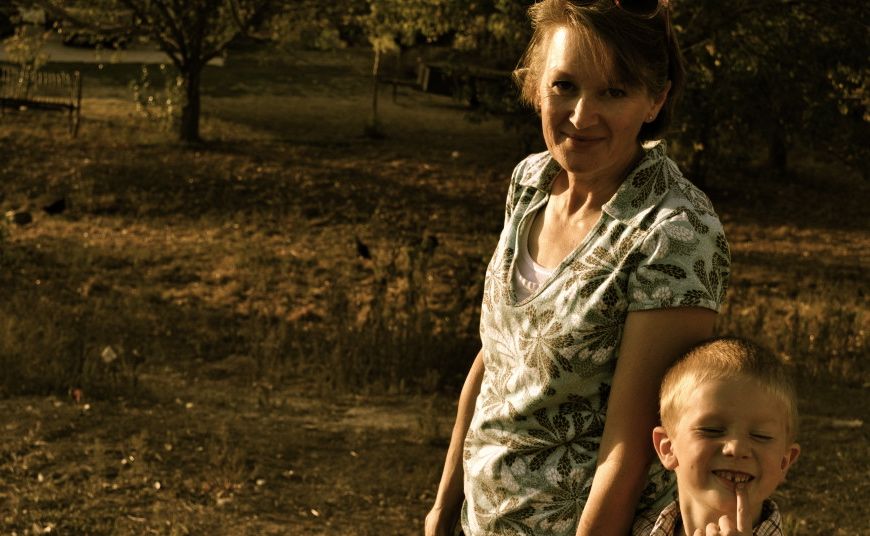
Gentle Readers: I’m not crazy about this picture of me, but I love this old picture of little Mack: What. A. Card.
On my blog, some of the most popular posts that folks pull up to read every day are the posts about eggs. My top-viewed post, most days, is this one where I shared a few easy tricks for how you can tell which of your hens is laying, and which are taking time off. Another very popular post is this one, inwhich I share a few tips on what I do for my chooks so they lay the most eggs possible–through the winter, especially. I’ve been keeping chickens at our place for nearly fifteen years now, without a single day off.
I love my birds, I do. One of my favorite things to do, first thing every morning, is to loiter at the chicken yard gate and watch my flock eat their breakfast for a few minutes, before I return to the house and all the dustandlaundry marvelous opportunities for service therein. 🙂 *sigh*
Chickens are awesome, folks. There are lots of reasons why I’m happy that it is so trendy to keep a few chickens. I’m happy for you, in fact, if you keep a few at your place. If you don’t, I feel a gentle bit of sorrow for you. And here’s the deal, and pardon me for delving into the *duhhh* realm of the Blatantly Obvious Statements, but here it is: simply put, the healthier your chickens are, the more eggs they will lay.
Seems too simply obvious to be true, doesn’t it? Let’s tweet it, okay? (Doesn’t your twitter feed need a bit of chicken wisdom?) (Yes, I’m pretty sure it does.)
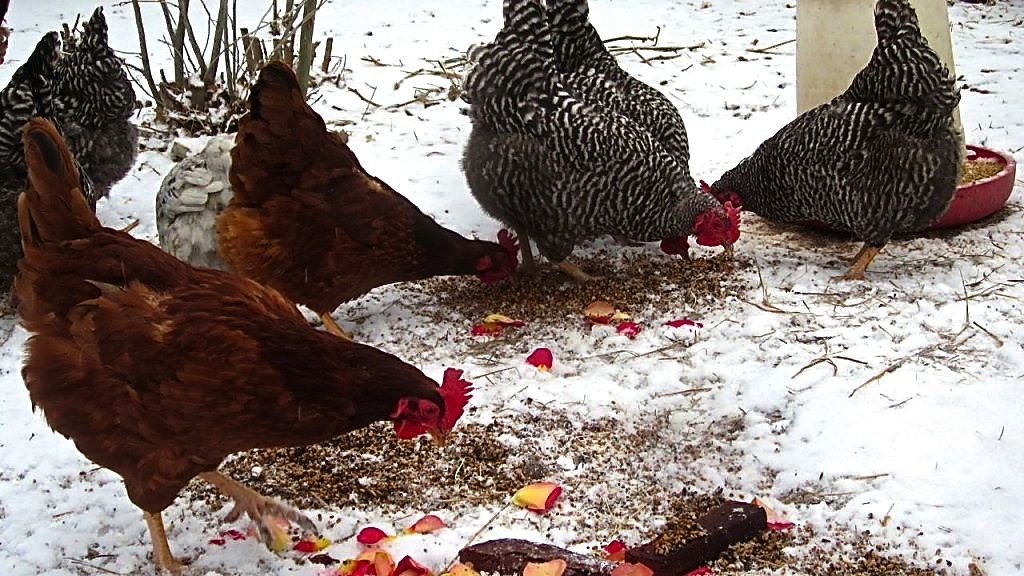
See how pretty and healthy they look? And yes, those are rose petals that they are snacking on. That’s the most romantic food you can toss to your chooks: edible flowers.
That’s not rocket science, is it? Chickens are designed to lay eggs. If they are in the peak of health, they will do what they are designed to do. If for some reason (or combination of reasons) they are not in the best of health, they won’t lay as many–or they’ll have problems of one sort or another. If they are fat and overfed? They won’t lay as many eggs. If they are underfed, or thirsty for fresh water, or being fed low-grade food, or too crowded or stressed or whatever, well, you get the idea.
I could draw a human parallel here . . . but I think I won’t go there. And you’re welcome. I’ll just pause a minute to let you think about it.
Done? Okay, let’s proceed . . .
This is the realm in chicken keeping, by the way, where Diatomaceous earth comes in. Here’s your science lesson for the day, and *curtsy* you’re welcome, my dear. Diatamaceous earth, or DE, is made from fossilized, microscopic, hard-shelled algae called diatoms. It kills fleas, ticks, mites, and parasites in the most ingenious (and effective!) way you can imagine: it slices into the outer shell of their bodies. Yuck, huh. And cool.
Yuck and cool.
Now here’s your vocabulary lesson for the day, and *deep bow* happy to help, mon cher. Desiccation is what this grisly process is called, and believe me, you wouldn’t want it to happen to you. Abso-positively-not. Most of the bitty critters die within a matter of hours. Which is good for you and/or your chickens, not so good for them (the bugs). Évidemment. (That’s French for “obviously.”)
Science and vocabulary lessons, in one fell swoop. Not to mention French! Think of how much smarter you are now, than when you started reading this! It fairly boggles the mind, doesn’t it?
Now here’s the great part that you can use, especially for your chicken flock. There were studies done a few years ago, where researchers added DE to the feed of chicken flocks. I’ve been reading about the studies here (you can, too, if you wanna) and they are impressive. My PhD hubby would be impressed with me, reading research with control groups and whatnot.
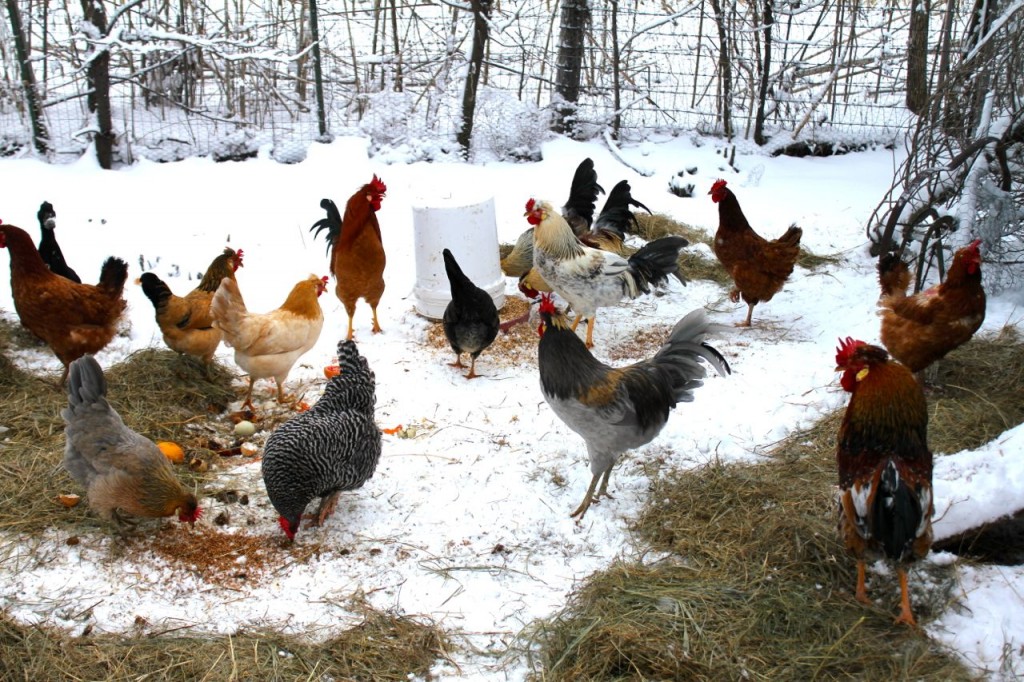
Here’s the gist of it: the effectiveness of DE as a treatment for parasites, and to increase feed efficiency and egg production of organically raised free-range hens was studied in two breeds of commercial egg layers. The two breeds differed in their resistance to parasites, to begin with. The DE given to the more parasite-resistant breed, the Lowmann Brown (or LB) hens, didn’t significantly affect their parasite load. However, the less parasite-resistant breed, the Boven Brown (BB) hens, given the DE, showed much less of a parasite problem than the ones that weren’t given DE.
More excitingly, though, (please don’t go to sleep on me here, this is the cool part that you and your chooks could benefit from!) both flocks, the BB and the LB hens that were fed the diet containing DE were significantly heavier and laid more eggs, and consumed more feed than hens fed the control diet, but feed efficiency did not differ between the 2 dietary treatments. One more thing: the BB hens consuming the DE diet laid larger eggs containing more albumen and yolk than hens consuming the control diet.
So–to make a long study short–if you feed your chooks DE, they will have fewer parasites and will be heavier and lay more and better eggs. Pretty cool, huh?
See why I was so excited when I learned this? And why I’ve been feeling a bit guilty for not sharing it with you, my chicken-loving friends, before now? Oh well. Water under the bridge, eh? Water under the bridge.
Well, there was this, too: both breeds of hens that were dusted with DE had a reduced number of mites. Mites can be a real problem for chickens, as you may or may not know, and one of the reasons that you’ll see your chooks burrow down into the dirt to take fluttering, ecstatic baths in the dust.
Here are a few quick tips for how to add DE to your flock’s feed:
- Only use “Food Grade” DE, as in the link above.
- Try to add about 2% DE to your feed. What I do: I scoop a cup or two of food grade DE and mix it in, every time I dump a bag of crumbles and a bucket full of corn to the feed bin that I keep out by my chicken coop. Don’t let it get wet! DE is not effective if it gets wet, even just a little bit. So my chooks get a bit of beneficial DE every time they eat a meal.
- Adding DE to your chooks’ feed supply boosts the nutrition of your flock, by adding many valuable trace minerals.
- And an added benefit: stirring DE into your chooks’ grain keeps bugs from living in it.
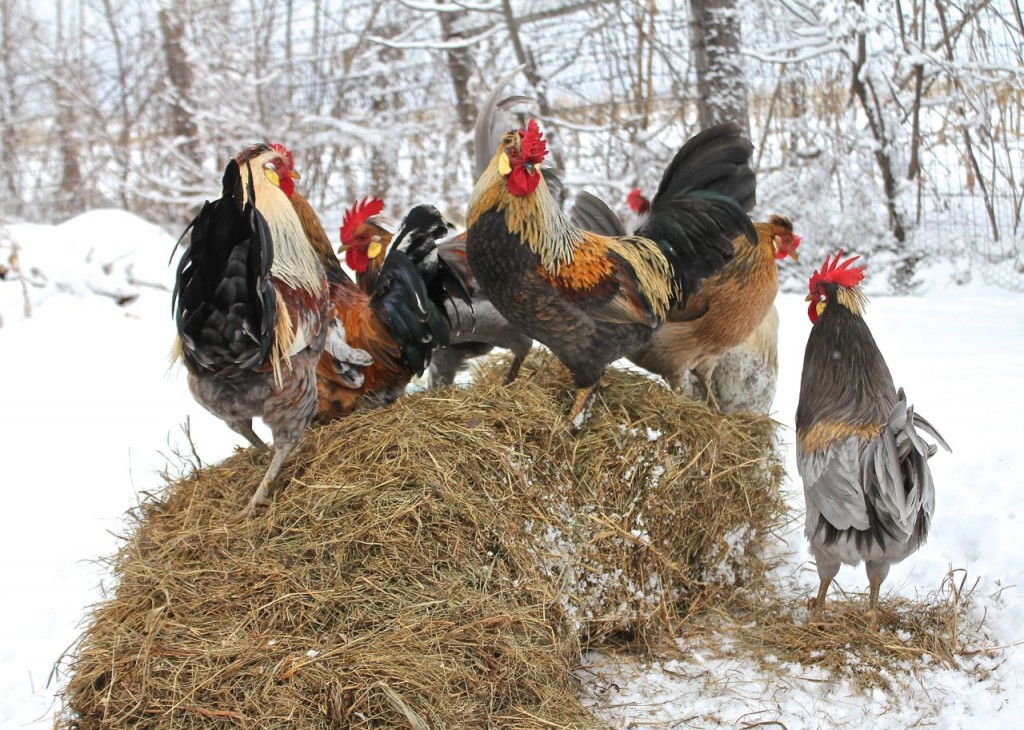
A healthy chicken is a handsome chicken is a happy chicken. 🙂 (You can quote me on that.)
Okay, and the benefits of using DE extend to better conditions of your nesting boxes and perches too, since that’s where mites* like to hang out (well, and on your chickens, too). Here’s how you can take advantage of this.
- Every time you clean out your nesting boxes (I do a quick swipe of my nesting boxes, usually, once a week), sprinkle a bit of DE into them, before you replace with fresh straw or hay or wood chips or whatever you stuff into your nesting boxes. (I use a mixture of hay, straw, and/or dry leaves. FYI.)
- Rub DE along roosts and into nooks and crannies of your coop, where those mites like to hang out. Use work gloves to do this. It can really dry your skin.
- Sprinkling DE in some of your flocks’ favorite dust-bathing spots (they all have them!) is a great way to help your chickens get as much DE as possible into their feathers, down to the skin where the mites live. But remember that once it gets wet, you’ll have to reapply it.
Want to learn more? Here’s the original information that inspired this post.
How safe is DE for you, if you choose to give it to your flock? As long as you use food grade DE, it’s perfectly safe. Of course, if you have respiratory allergies of any kind, I’d use common sense and a face mask when you work with it, like you would if you worked with any dusty substance. And I certainly wouldn’t hang out in the coop after you spread it around, at least until the air clears.
But you already knew that.
There ya go, my dear chicken-loving friends. One more piece of the puzzle to fit together, on how to have the healthiest and most productive flock that you can! (And you’re welcome.)
*curtsy*
and *hugs*
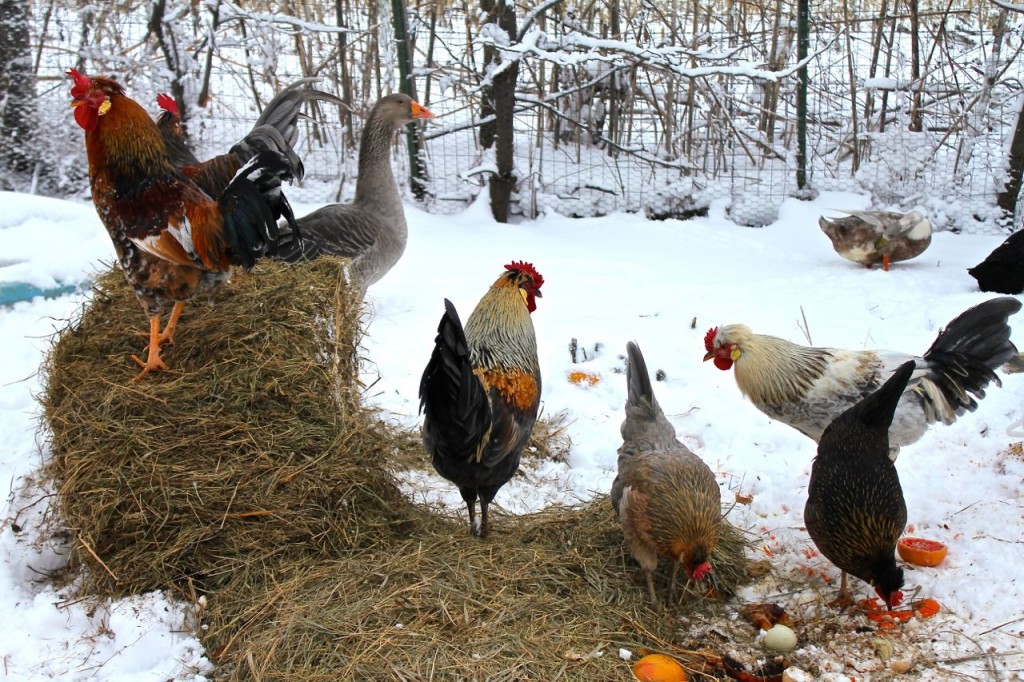
*and whatnot*
- You can make superb restaurant-worthy Shoyu RAMEN at home!
- Appliance Despair, Part I: a journal entry, circa kitchen remodel (private!)



The info on DE was great. I have used it in the coops and tried to give them free choice in a separate container like their grit, but never had any luck with them eating it. However, I do have a couple of questions, not necessarily associated with the DE but on the same lines. I feed my chickens predominately sprouted barley. They do get some laying pellets, but that is not their main diet. I have searched high and low to find a mineral supplement for them as I don’t like the “stuff” in the commercial laying feed. Also, creating feed with all the different things herbs and veggies is cost prohibitive. So…do you have any suggestions as to where I could find such a mineral supplement for them. I did not know DE had trace minerals in it so that will help some. I can mix DE with their laying pellets but as I said they don’t get a lot of that and the sprouts are damp. A mineral supplement would be great if you have any ideas. Thanks alot. Enjoy your blog.
Dareen, great question! Unfortunately I don’t have a great answer for you. I would caution you against feeding 100% grain, though. Even though chooks do gobble up grain (mine eat lots of sprouted grain, too) I know that they are designed to eat a wide variety of foods–like us!–and will (imho) develop dietary gaps if they eat just one food. Think if you only ate pancakes every day. Morning, noon and night. You’d start suffering in one way or another, as your body would lack nutrients and micronutrients. I do mix commercial feed + cracked corn + sometimes scratch grains + DE for my chooks. I mix it in a big trash can (lots of chooks) and I feed it to them, their choice, every day. If you don’t like the commercial feeds, there are (pricey) organic alternatives that you might look into. I don’t know about a specific mineral add-in for chooks, but you might ask at the feed store? Also you might ask the question of these folks on the Backyard Chickens Forum: http://www.backyardchickens.com/f/ They are very helpful!
This is a great thing for people too, removes heavy metals and other junk from the body, one of the cheapest detoxes you can do 😉
Rebecca, that is what I’ve read. Do you have a resource or a link about it that you would share with me?
Amy,
Great information! I did read somewhere that while employing the deep liter method (which I am for the first time) that you should not use DE. Is this true or is it ok?
Thanks
Lynda, I can’t imagine why there would be recommendations against using DE with deep litter–except for possibly a buildup? I don’t know. I’m sorry that I’m not more help! I do use deep litter, and I use DE, and I’ve never had anything adverse happen to me and/or my chooks because of it. I do focus more on dusting the nesting boxes with it, though, as opposed to adding it to the litter.
I did read somewhere (I think Fresh Eggs Daily) that DE can interfere with the bacteria that breaks down the organic matter when you use the deep litter method. I too put DE in my chicken food and occasionally their nesting boxes. I just don’t use it in the general coop area. And btw my husband & I both consume DE everyday. A glass of water in the morning with a shot of Apple Cider Vinegar and a healthy teaspoon of DE. Lots of info about DE online! My brother swears it helps him with his MS! (I am not a health professional… just repeating what was told to me!) ☺
Yep, Diane, I got lots of comments about folks using DE for whatever ails them. I’m going to do a bit more research on it, but it sounds like you’re in great company!
As we learn something new every day, or should try too, I look forward to the lessons you teach in the art of caring for your chickens. I will ask my brother in law, who happens to care for our little flock, if he is feeding them correctly. I feel an adjustment is going to be needed. He and his family have about 7 or 8 dogs, the count varies, that my wife and I feed daily. I tried buying feed for him to use but he was feeding it all to his favorite dog and the rest were left to scratch along with the chickens. We have corrected that but it is expensive to feed his dogs along with ours. So now we will be adding DE to our chicken feed. So far I have been leaving most of the eggs for him to use or sell. Not anymore, I think I will start bringing more to the casa for myself. Thanks teacher………
Oh Chef, right back atcha! I learn a lot from your blog, too–like–honey, let’s move to Mexico! 7 or 8 dogs, my, that is a lot of dogs to feed. I’m a bit surprised that they haven’t decided to go after the chickens. Using DE is popular for other animals, too, and those dogs would undoubtedly benefit from a bit of it in their food now and then, too.
How much is a “bit” of DE in each nesting box; 1 tsp?
Sue, I’d say 1 tsp in each nesting box is enough.